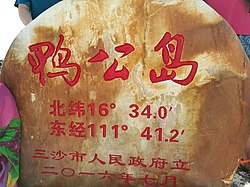Yagong Island (Chinese: 鸭公岛; pinyin: Yāgōng-dǎo; Vietnamese: Đảo Ba Ba) is an island in the Crescent Group (Yongle Qundao 永乐环礁) of the Paracel Islands, in the South China Sea. It is also known as "He Duck" (male duck) due to its shape.[1] It is located a few hundred metres southwest of Observation Bank (Silver Islet, Yin Yu (银屿), Bãi Xà Cừ) in the northeast of the Crescent Group.
Yagong Island | |
|---|---|
| Yagong Community | |
 Monument on the island | |
| Coordinates: 16°34′00″N 111°41′11″E / 16.56667°N 111.68639°E | |
| Country | China |
| Province | Hainan |
| Prefecture-level city | Sansha |
| County-level division | Xisha District |
| Township-level division | Yongxing Dao Neighborhood Committee |
| Area | |
• Total | 0.013 km2 (0.005 sq mi) |
| Dimensions | |
| • Length | 0.175 km (0.109 mi) |
| • Width | 0.075 km (0.047 mi) |
| Time zone | UTC+8 (China) |
It is occupied by the PRC, and like all of the other Paracel islands, it is controlled by China (PRC) and claimed by Taiwan (ROC) and Vietnam.
It is administered as the "Yagong Community", a village-level division of the Yongxing Dao Neighborhood Committee township-level division, in the county-level division of the Xisha District, of the Sansha prefecture-level city, in the Hainan province.
It has an area of just under 1 hectare (9,800 square metres (2.4 acres)) and a residential population of about 100 fishermen with solar power and a desalination plant.[1]
Prior to 2013, the island was a barren stretch of coral and clamshells surrounding a central lagoon, providing a temporary stopover and resting place for fishermen. In 2013, the PRC shipped 120 tonnes of soil, 200 tonnes of fresh water, coconut fibre, and 400 trees to the island as part of a Sansha-wide greening project.[2] As of 2013, regular tourist visits were made to the island by a cruise line, which also supplies the 78 registered (in 2016) residents with groceries.[1]
References
edit- ^ a b c Liu Zhen (23 May 2016). "Yagong Island was no place for a dog, now it's home to 400 trees : Villager estimates each tree on remote South China Sea island cost 20,000 yuan". South China Morning Post. Retrieved 2 July 2017.
- ^ "China Focus: South China islands see green transformation". news.xinhuanet.com. 30 July 2014. Archived from the original on 13 September 2014. Retrieved 13 September 2014.
